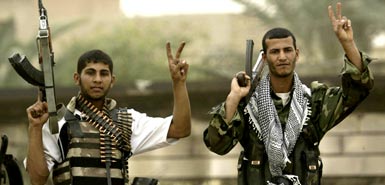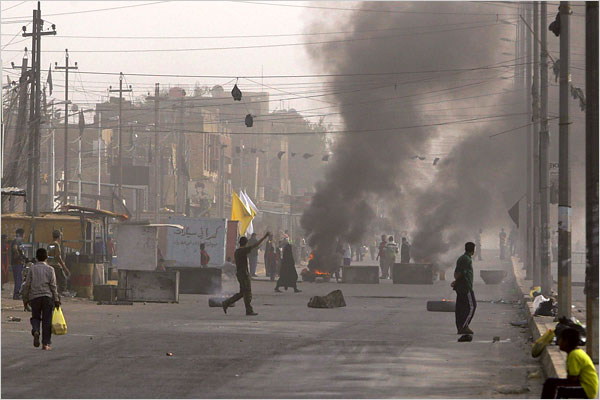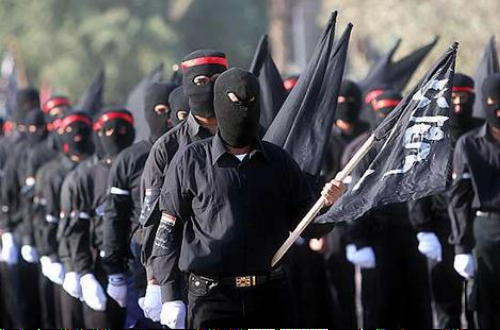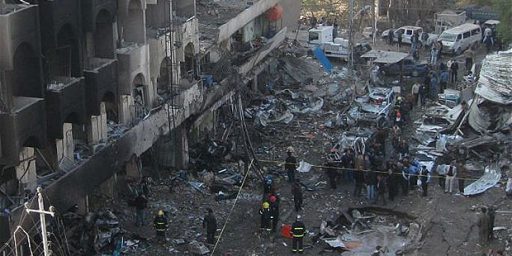Defeated Maliki Accepts Cease-Fire
Six days of Shiite-on-Shiite warfare in Basra appear over after Mahdi militia chief Moktada al-Sadr sued for peace* and the government agreed in a deal brokered by Iran. Whether this gets scored a “win” for Sadr or Prime Minister Maliki will likely vary depending on the predisposition of the evaluator. Based on what we know now, though, Maliki’s gambit in taking on the Mahdi Army failed.
Erica Goode and James Glanz for the NYT:
The Shiite cleric Moktada al-Sadr on Sunday called for his followers to stop fighting in Basra and in turn demanded concessions from Iraq’s government, after six days in which his Mahdi Army militia has held off an American-supported Iraqi assault on the southern port city.
The substance of Mr. Sadr’s statement, released Sunday afternoon, was hammered out in elaborate negotiations over the past few days with senior Iraqi officials, some of whom traveled to Iran to meet with Mr. Sadr, according to several officials involved in the discussions.
Still, though fighting was reported to have died down by late afternoon in Basra, it continued in Baghdad, including heavy combat by Iraqi and American troops and aircraft in the Mahdi Army stronghold of Sadr City, casting uncertainty on the deal. A strict curfew imposed by the government on Thursday was lifted at 6 a.m. Monday.
The negotiations with Mr. Sadr were seen as a serious blow for Prime Minister Nuri Kamal al-Maliki, who had vowed that he would see the Basra campaign through to a military victory and who has been harshly criticized even within his own coalition for the stalled assault. Last week, Iraq’s defense minister, Abdul Kadir al-Obeidi, conceded that the government’s military efforts in Basra have met with far more resistance than was expected. Many Iraqi politicians say that Mr. Maliki’s political capital has been severely depleted by the Basra campaign and that he is in the curious position of having to turn to Mr. Sadr, a longtime rival, for a way out.
And it was a chance for Mr. Sadr to flaunt his power, commanding both armed force and political strength that can forcefully challenge the other dominant Shiite parties, including Mr. Maliki’s Dawa movement and the Islamic Supreme Council of Iraq. In the statement, Mr. Sadr told militia members “to end all military actions in Basra and in all the provinces” and “to cooperate with the government to achieve security.” But Mr. Sadr also demanded concessions, including that the government grant a general amnesty for his followers, release all imprisoned members of the Sadrist movement who have not been convicted of crimes and bring back “the displaced people who have fled their homes as a result of military operations.” It was not clear if the government was willing to meet those demands.
Mr. Sadr’s willingness to negotiate represents a significant shift from his stance in 2004, when he ordered his militia to fight to the death in the holy city of Najaf, and suggests that his political sophistication and strategic skills have grown in the last two years. In an interview, Mahmoud al-Mashadani, the Parliament speaker and a senior Sunni politician, said, “With this statement, Sayyed Moktada al-Sadr proved that he is a good politician, working for the sake of Iraq.”
[…]
The continuing fighting on Sunday left the ultimate significance of the statement uncertain, said Qassim Daoud, a former national security adviser who leads a secular Shiite party that has supported Mr. Maliki in the past. But the muddle that has emerged from what was supposed to be a decisive assault has serious consequences for the prime minister, Mr. Daoud said. “The government now is in a weak position,” he said. “They claimed that they are going to disarm the militias and they didn’t succeed.” Asked if the erosion of support for Mr. Maliki could cause his government to fall, Mr. Daoud paused and said, “Everything is possible.” He said Mr. Maliki began the campaign in Basra without consulting outside his inner circle or members of Parliament.
The parallels between this action and the Israelis’ 2006 invasion of Lebanon to take on Hezbollah are striking. In both cases, the party that initiated the escalation into high level conflict inflicted substantial damage on their adversary and were able to claim military victory. At the same time, neither came anywhere close to achieving their political objectives. In assessing the 2006 action, I concluded that Israel therefore lost. Absent substantial new information, I’d have to conclude that Maliki was the loser here for the same reason.
We’ve essentially returned to the status quo ante, which would seem to be better for Sadr than Maliki given that Maliki’s initiation of conflict is a fair indicator that he was less happy with prevailing conditions. The infrastructure in Basra has obviously sustained some damage, making the central government’s task in rebuilding the economy more complicated.
The Iraqi Army has, once again, proven itself to be a collection of amateurs, a substantial number of whom are cowards and/or disloyal. AP’s Charles Hanley provides a timeline of our efforts to stand up a competent force capable of fighting without American support and concludes, “Year by year, the goal of deploying a capable, free-standing Iraqi army has seemed to always slip further into the future.” It’s hard to argue with that assessment.
More importantly, any illusion that Iraq is near political reconciliation has also been shattered. The Western media division of Iraqis into merely three sects — Shiite, Sunni, and Kurd — is obviously wrong, as there is substantial discord within those groups. It’s difficult to imagine that six days of killing one another is going to lessen that in the near term.
The only hope, really, is that Sadr’s support will start to dry up in reaction to this episode. Perhaps war-weary Iraqis will decide to get behind their government. More likely, though, they’ll simply blame Maliki and double down on Sadr. Which, frankly, would seem the more prudent bet.
*UPDATE: Or maybe not. While the tenor of the first reports I received on this, including NPR’s early coverage, indicated that Sadr had initiated this, McClatchy’s Leila Fadel tells a different story:
A parliamentary delegation from Prime Minister Nuri al-Maliki’s own coalition (mainly now the Da`wa Party and the Islamic Supreme Council of Iraq) defied him by going off to the holy seminary city of Qom in Iran and negotiating directly with Sayyid Muqtada al-Sadr and with the leader of the Quds Brigades of the Iranian Revolutionary Guards, Brig. Gen. Qasim Sulaymani.
As a result of those parleys, Muqtada al-Sadr called on his followers to stand down, though I read his statement as permitting continued armed self-defense, as at Basra where the Iraqi Army is attacking them and the US is bombing them. Significantly, he calls on the Mahdi Army to stop attacking the HQs of rival political parties. That language suggests that the parties are suffering from such attacks and are worried that party infrasture is being degraded ahead of the October 1 provincial elections. The southern parties have essentially defied al-Maliki and Bush to make a separate peace.
Juan Cole, at least, finds that account plausible.






Your analogy between the Israeli-Hezbollah conflict and the operations in the vicinity of Basra is an interesting one, James. Back in 2006 I noted that the clear winner of the Israeli-Hezbollah conflict was Ehud Olmert. Israel’s loss but Olmert’s win by simple virtue of holding on to his position despite approval ratings which from time to time have caused him to look enviously at George Bush’s and prior to the conflict bid fair to bring his govewrnment down.
Is there an analogy in the Iraq situation? Is it possible that Maliki (not Iraq or even Maliki’s faction) has won this round?
Just asking the question. I don’t know the answer.
Why would “war weary” Iraqis back Maliki, the guy who initiated hostilities? Sadr gave clear orders to only fight defensively and pushed for a brokered peace. He’s clearly gunning to take control of the government democratically in the October elections, and my guess is that he will succeed. I don’t know if he’ll be better at the job than Maliki, but let’s face it–there’s very little chance he will be worse.
Because they’re not interested in living under AlSadr, for one thing.
And by the way, James, I read this differently; Sadr pulled his troops because he recognizes… again… that he cannot win. If he had a hope of winning, do you really consider he’d be pulling his forces? Sorry, I don’t. That attributes to him qualities of logic he has not thusfar exhibited.
I further this by pointing out that it is Sadr who sued for peace, not Maleki.
The only hope, really, is that Sadr’s support will start to dry up in reaction to this episode. Perhaps war-weary Iraqis will decide to get behind their government. More likely, though, they’ll simply blame Maliki and double down on Sadr. Which, frankly, would seem the more prudent bet.
From all reports, Sadr has far more support than Maliki. Given that Maliki *lost* and Sadr *won*, I’m not sure what possible motive the Iraqis would have to back Maliki. They’ll back their government when Sadr has control over it, which seems highly likely at this point, reading between the lines of the deal that Maliki made with Sadr. It’s rather odd that you think people are going to jump to the obvious loser in this fight because they’re “war weary”. Seriously. From all reports, it’s the supporters of Maliki who have the morale issue and the Sadr supporters who don’t.
“From all reports, Sadr has far more support than Maliki…”
What reports?
Just maybe the obvious loser is Sadr not Maliki. As I recall, Sadr is still in Iran. Not a very good example for his fighters.
They’re not interested in living under Maliki either. And presumable Sadr wouldn’t put himself forward was a candidate, he’d be a background player like Sistani is to the current government.
As I mentioned in another post on Sadr, he seems very timid in seizing power. While he couldn’t have won a military victory, he could have embarrassed Maliki much more than he did, and boosted his own status, but he didn’t. I’m beginning to think that Sadr doesn’t actually like sending his followers to their deaths, which is all in all a good quality. As for his logic, what has he done that makes you doubt his abilitiy?
Sadr has long set himself up as a unifying force in Iraq, between his voluntary cease fire over the past year, and his brokering peace deals during the height of sunni-shia violence, even sending aid to Falluja during the US siege. A brokered peace does more for him nationally than a military victory in one city would do.
Kind of throws a monkey wrench into our “when they stand up, we will stand down” strategy, no?
How much blood and national treasure will we waste waiting for an even which seems unlikely to ever happen? We are interfering in culture we do not understand. They are never going to stand up, at least not the way we define it.
Only if we ever intended to stand down.
Davod, I guess you get the majority of your news from Fox.
It’s hard to read this without getting the point that it was the government that blinked and not Sadr, the Iraqi government turned to Iran and not the US when it needed diplomatic help and there is no guarantee that the battle between the government and the Sadr forces is not over. WRT support, from the NPR report this morning, it’s pretty clear that the police were simply collaborating with Sadr in Baghdad. We have multiple reports of police and the Iraqi army surrendering to Sadr. And then there’s the fact that the reason why Sadr won, in large part, was that they actually care about what they’re fighting for. Arguably, they have less access to quality weapons, less training, less logistical and tactical support. Heck, they don’t have a frickin’ air force. And yet they managed to have the Iraqi government not just blink, but apparently acquiesce to their demands. And not just that, but Malakis own people went to Iran – the country you’re laughing at Sadr for residing in at the moment – to get the problem solved. Apparently behind his back.
Only if we ever intended to stand down.
Indeed, the only logical conclusion one can make – and one that Sadr has clearly drawn – is that we do not intend to ever stand down – endless occupation.
Something that I’m pretty sure doesn’t sit well with the vast majority of Iraqis.
I don’t think that was ever anybody’s intention, I was merely stating that anjin’s statement requires that assumption.
More likely everybody involved in getting us into this war intended a quick turn around in Iraq, flowers and candy and such, then off to democratizing Iran and Syria. I attribute this mess to arrogance and incompetence, not malevolence.
I don’t think that was ever anybody’s intention
I think it’s very hard to read the PNAC documents, look at the massive permanent bases we’re building and say that this wasn’t anyone’s intention.
then off to democratizing Iran and Syria
Granted, I don’t think anyone bargained on a multi-year occupation, but pushing dominoes over in the middle east requires bases and Iraq was obviously the first of these. It’s true that they obviously thought they’d be able to install a friendly head on the decapitated body and everything would be fantastic, allowing US forces to concentrate on the front, not the rear, but that’s still intending to stay there and use their country.
I attribute this mess to arrogance and incompetence, not malevolence.
Well, sure. But that doesn’t mean they didn’t intend to use Iraq as a base for the rest of the dominoes. Arrogance and imperialism is pretty much all you need for that. Incompetence is quite clear given that every single step along the way has been the wrong step. And when you start with the grossly mistaken premise of preemptive war against a country which didn’t threaten us except in the wild fantasies of the super paranoid, it’s hard to see how you recover from that and start doing things right.
But again, non of this precludes the intention of staying in Iraq pretty much forever. The parameters have changed given the inevitable unfolding of plans made by fools and implemented by incompetents. But the dream remains the same.
“As I recall, Sadr is still in Iran. Not a very good example for his fighters.”
Posted by davod
For four years I’ve seen the major anti-Iranian Shiite militia leader painted as a tool of Iran, while groups organized in Iran are painted as Our Friends.
while groups organized in Iran are painted as Our Friends.
Indeed, let’s not forget that Maliki has always been in bed with Iran.
Mostly beacuse ths would ahve forced Maliki’s hand… soemthing Sadr couldn’t deal with given his lack of people to deploy.
Maliki played his hand without the need of Sadr’s provocation, and it turns out he has a pretty poor hand. Sadr doesn’t need people to deploy because, as I stated earlier, he wasn’t out to get a major military victory. All Sadr had to do was deny a military victory to Maliki, which he did. Politically, Maliki lost big on this gambit, while Sadr probably got a small boost to this credentials. I wouldn’t necessarily paint this as a Sadr win, but it is definitely a Maliki loss.
But that is not the same as not standing down in Iraq. Presumably we couldn’t move on to Iran and Syria without having stopped military actions against Iraqis. Just as we’ve “stood down” in Japan and Germany, but keep bases there so we can “stand up” in other parts of the region.
Well we already had Kuwait and Saudi Arabia, but Kuwait would be vulnerable to Saddam (or even Iran), and Saudi Arabia is already a tricky ally at best, and launching our democratization initiatives from there would have caused us other political problems. Obviously a liberal democratic Iraq would have been the ideal launching point, and the war planners seemed to have assumed it would be easy to create.
So, doesn’t this kinda of put the lie to any statement that Maliki runs a functioning, legitimate government? I mean, remember all the pundits swearing blind that there was not really a civil war going on in Iraq? And the the people the purple-fingers put into office were actively making Iraq a better, funner place to be each & every day? And how the surge was working because _it_ was helping the legitimate Iraqi gov’t work better?
Michael is right; Sadr could have made this much messier that it was if he wanted to – Maliki certainly couldn’t have prevented him from doing so – and the most likely reason is that he wants to take over an actual, vaguely-unified Iraq when Maliki’s puppet administration gets kicked out by legitimate processes, rather than a bloody coup. You say those elections are scheduled for October? Right before our next elections? Hmmmm…..
Mostly beacuse ths would ahve forced Maliki’s hand… soemthing Sadr couldn’t deal with given his lack of people to deploy.
That’s not why. Sadr didn’t press his victory further because of the gradually growing possibility that Maliki would tricked, wheedled or coerced American troops into fighting for him.
Sadr clearly has a quiet deal with the Petraeus. it’s not without moments of friction, but it allows American troops to stay out of the South – which is a strategic neccesity for them, because they have their hands full already – and it allows Sadr’s body parts to stay attached to each other.
Sadr had a tricky situation – a military assualt with the threat of a *competent* American escalation behind it. He dealt with it rather wisely, by humiliating the initial assualt and then de-escalating.
From the reports I’ve heard, Coalition forces were already involved in the fighting. Specifically they were providing air fire against Sadr’s forces in Sadr City and I believe Basra as well.
Ha! That’s some of the best wording I’ve read in a while.
Reading these posts, I am shocked they are being made by Americans. If you get your news from the NY Times, you are not getting news, but propagada. Giving credibility to the gray lady is something fewer are doing today. Sadr sues for peace and wins??? I guess Japan won WWII. Fools can believe what they want, and on this blog they do, but if one does just a little reading and investigating it is possible to glean the truth about a situation. Maliki should not have allowed a militia to retain their weapons, unless they have the equivalent of our 2nd Amendment protection, as they will be used against the central government again. But, unlike the Iraqi defense force, the Madhi army will only grow weaker with time. Once the Iraqis reconsistute an armor force with air power, no militia will be able to stand against them. Some of you are so full of poop you stink.
As I recall, Sadr is still in Iran. Not a very good example for his fighters.
Sadr is in Iran bolstering his religious credentials so that he can challenge (to some extent) the religious authority of more senior religious figures like Hakim and even Sistani. If Sadr progresses, he may get to the level where he can issue his own religious rulings (fatwas).
He is not in Iran to hide, but rather to assist his larger objectives. His fighters are more than aware of this. In fact, they derive inspiration from his religious mission in Iran due to the wider implications.
Anyone interested, go over to Big Lizards to read what Bill Riggol wrote about what has happened. His take is just a little different from that of the NY times. Evidently the Mahdi army has been taking serious losses each day. They are short of ammunition due to the Iranian border being closed. Riggol has been imbedded with the U.S. Army, Marines, Iraqi Defense Force and Iraqi police. His perspective might be better than some analyst hiding at his desk in NYC.
The thugs come. They proclaim “real Islam†or “fighting the infidelâ€. They act like total criminals. They are expelled. They are not invited back.
This has been going on in Iraq for over a year.
It amazes me that so many here do not understand the dynamic.
It is rather simple. Not hard to understand. It has been repeated repeatedly.
Will Sadr come back? Well you have to ask yourself why he is hiding under a bed?
Did Nasrallah gain victory? Another guy who has to use a bed as cover. Victory for Nasrallh – “We are never going to do something that stupid again. We can shoot a few rockets every once in a while to keep up appearances.â€
My favorite picture of that war – the “victors†high tailing it across a river with the unwounded holding plasma infusions for the “walking†wounded. Real winners at least have ambulances.
Sadr could have made this much messier that it was if he wanted to
So true. He could have had 5,000 dead to clean up instead of only 500. You have to give him credit for not wanting a bigger mess.
“Sadr is in Iran bolstering his religious credentials so that he can challenge (to some extent) the religious authority of more senior religious figures like Hakim and even Sistani. If Sadr progresses, he may get to the level where he can issue his own religious rulings (fatwas).”
It is my understanding that Sadr (while he is descended from a line of high religious figures) got where he is by murdering a more moderate leader of his particular group.
No, he is accused of ordering the murder a more moderate leader of another group, because he was supporting someone who was suspected of involvement in the murder of Sadr’s father. Sadr already had his position before this episode.
maliki said there would be no truce, there would only be defeat for sadr… so who won?